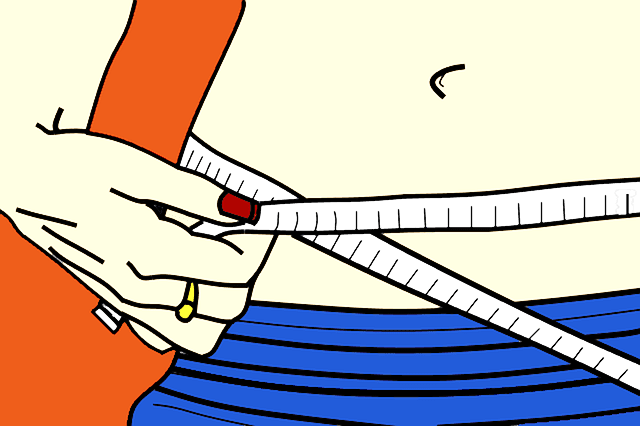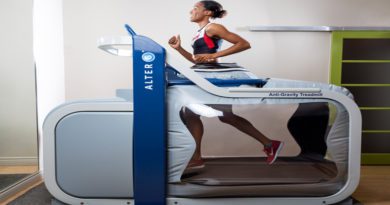Two Numbers That Are More Important Than Your BMI Score
If you’ve followed my content over the years, you know I’m really not a fan of gauging your weight (or even your health) off of a BMI score or body mass index if you’re an active individual who exercises regularly. Why is this? Because a BMI score is calculated using your height and weight and doesn’t take into consideration how much muscle mass you may have.
Let’s use a bodybuilder for example. Most bodybuilders are short in stature yet have a lot of lean muscle mass on their frame. If you were to look at their BMI score, they would tend to be in either the obese category or even the morbidly obese category. Now, knowing this and looking at them you may be scratching your head as they have a visibly defined six-pack, extremely defined musculature, and are well under 10% body fat almost year-round. This shows the massive flaw in using a BMI score to determine a healthy weight as well as a snapshot of your overall health.
Therefore, there are actually two other numbers I feel are much more important than looking at a BMI score to determine if you’re at a healthy weight or not and I have them listed below.
Disclaimer: This article is for informational purposes only and is not meant to treat or diagnose any condition. It is recommended that you speak with your doctor before starting any exercise program, changing your daily nutrition, or adding any supplements to your regimen.
Table of contents
Focus on These 2 Numbers Rather Than Your BMI Score
Stop focusing on your BMI score and put your focus into these numbers.
1. Body Fat Percentage
A more important number than a BMI score is how much actual body fat you are holding. Now, not all body fat is “bad.” In fact, you need some body fat on your body which is used to protect your vital organs. But with that being said, holding onto an excess amount can negatively affect your health and put you at risk for certain illnesses and diseases.
Check out this BMI calculator!
When looking at normal and healthy body fat percentages, women should be between 21-31% while men should be between 14-24%. These values are where you should strive to be. If your body fat percentage is higher than your designated range, you should consider changing your nutrition and exercise program to help lose body fat and bring your weight down.
There are several ways for you to check your body fat percentage and I really want to focus on the ones you can do in the privacy of your own home. If you prefer to have a professional test your body fat at a gym or fitness center you may do so as that will be the most accurate, but if you plan on having your body fat checked once a month (maybe more, maybe less) that is going to come with a cost.

Some of the items you can purchase fairly inexpensively for at home would be a scale that can also measure body fat or a handheld bioimpedance device. Both of these send an electrical signal (it does not hurt, and you don’t even feel it) throughout your body and provides you with a percentage based on the resistance and how much time it took to run throughout your body. If you have some experience with calipers, you can even purchase your own set of calipers and do your own body fat analysis – or have a family member or friend help you with your skinfolds.
Looking at your overall body fat is a much better factor for looking at your weight and overall health when compared to a BMI score. One thing you do need to take into consideration is room for error. While scales that test body fat and bioimpedance devices are great, they do come at the cost of being slightly off with their readings. Time of day, how much water you drank or food you ate prior, all come into play with the accuracy of the readings. However, if you use them at the same time of day and the same day of the week regularly, you can at least measure if your body fat percentage is going up or down and make the necessary changes to your nutrition and workouts accordingly.
2. Muscle Mass Percentage
The second number that I would recommend you pay attention to more than your BMI score is your muscle mass percentage. If you carry a lot of muscle, it can totally throw off your BMI score. Because BMI looks at height and weight, it completely negates the fact that you could possess a lot of muscle – more than the average person.
Generally speaking, those who hold a lot of lean muscle mass tend to be a little leaner too because muscle needs constant energy and in order to provide such it burns calories in the process. The downside is, as we age, we tend to lose upwards of 5% of our lean muscle mass every 10 years (if you want to get geeky, the loss of muscle mass as we age is called sarcopenia). Less muscle mass means you could potentially gain body fat more easily due to your metabolism slowing down. For that reason, keeping tabs on your muscle mass percentage is extremely important and can be tied in directly with checking your body fat percentage as well.
Through resistance training, you can not only increase your strength but you can also start the process of building lean muscle by breaking down the muscle fibers so you can feed them and provide adequate rest to improve recovery and form bigger and stronger fibers (this is called hypertrophy).
As you can see, there are much more accurate ways to determine your current health and weight. The two numbers explained above trump a BMI score every day of the week. While looking at your BMI score is a simple way to get a “guestimate” without the need for getting your body fat and lean muscle mass checked, it’s not an ideal measurement in the long term. Especially if you check your BMI score and continue putting on lean muscle tissue as your score would come back that you’re becoming more and more “unhealthy” which is not true.


*Disclosure: This article may contain affiliate links or ads, which means we earn a small commission at no extra cost to you if you make a purchase through these links. These commissions help support the operation and maintenance of our website, allowing us to continue producing free valuable content. Your support is genuinely appreciated, whether you choose to use our links or not. Thank you for being a part of our community and enjoying our content.
PLEASE CONSIDER SHARING THIS ON YOUR SOCIAL MEDIA TO HELP OTHERS LEARN MORE ABOUT THIS TOPIC.





